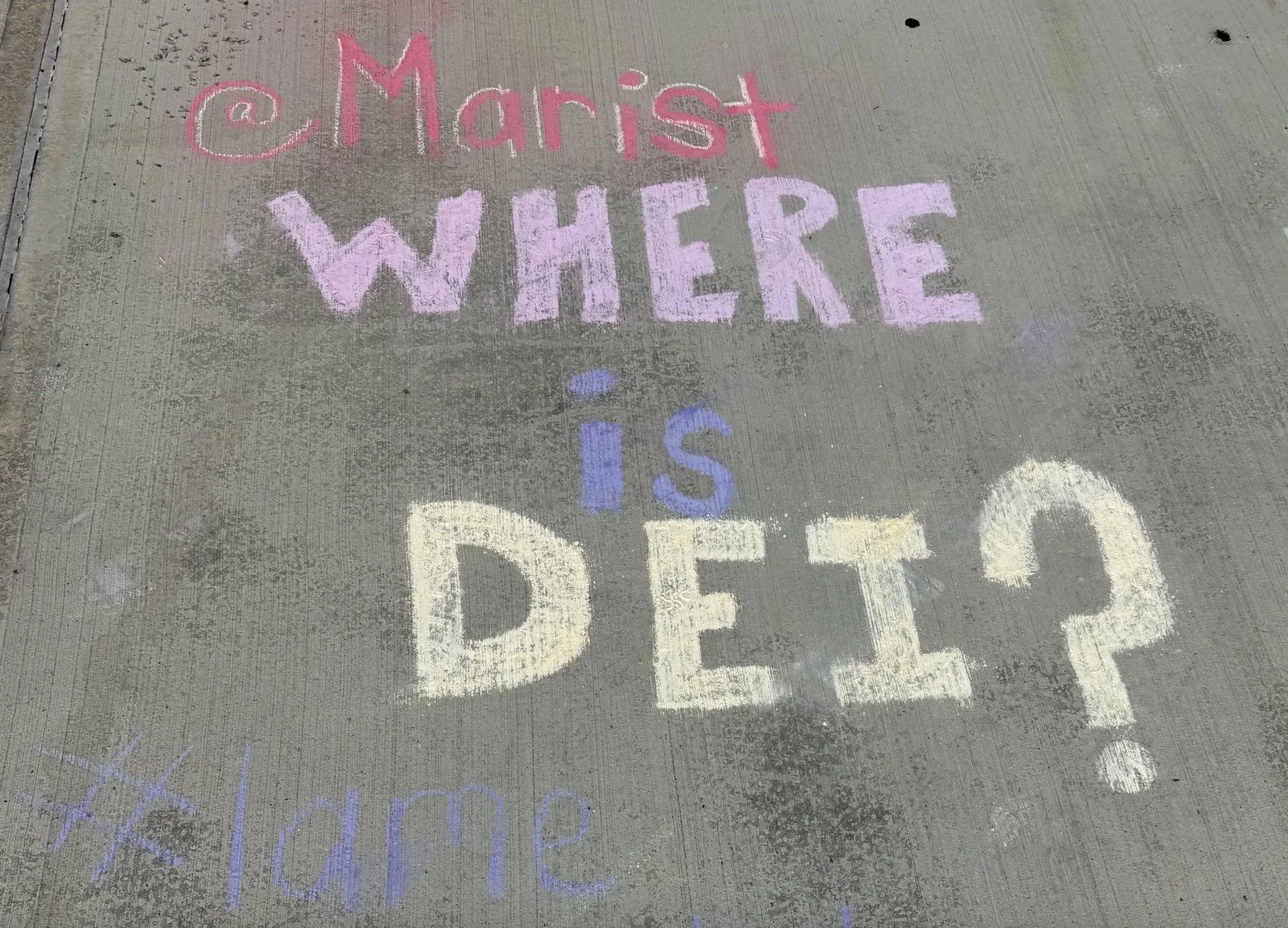It’s “Just” A Name Change: DEI To C&B
A chalk message outside Dyson question the replacement of the Office of DEI on Oct. 2. Photo courtesy of Itati Serrano '26
Marist University falls into the apolitical trap by renaming the former Office of Diversity, Equity and Inclusion (DEI) to the Office of Community and Belonging.
In a recent email regarding the name change, the former vice president of DEI, now vice president of Community and Belonging, Dr. Edward Antonio wrote, “The change in name is more than cosmetic: it signals an important shift that I believe better captures the spirit and substance of our work since I arrived at Marist. It reaffirms our commitment to ensuring that difference is not only acknowledged but welcomed, respected, and woven into the fabric of our life together.”
In the email announcing the rename, we students have been assured by Marist President Kevin Weinman, “while the frameworks used to define this work, and the work itself, have constantly shifted throughout our history – sometimes driven by institutional strategy, sometimes by societal shifts and needs – our commitment to these values has never wavered.”
Just over a year ago, the Marist Circle published an article in which Antonio said, “I want to lean into the values of this community, values of inclusion, values of belonging, a commitment to equity, the fact that we are not afraid of our differences.”
Even more recently, on April 23, Weinman signed onto a statement that affirms the essential role of higher education in American society, reading, “It expresses opposition to intrusions that might threaten academic freedom, open inquiry, or institutional autonomy while acknowledging an openness to constructive reform and legitimate forms of government oversight.”
Why the change? Maybe the federal government holds a portion of our purse.
So I checked.
Per our Consolidated Financial Statements and Report of Independent Certified Public Accountants of 2024 and 2023, the federal loans provided by the federal government “represented 0.2% of total assets.”
As for our Federal Perkins Loan participation, “funds advanced by the federal government of $1,767,534 and $2,245,405 at June 30, 2024, and 2023, respectively, are ultimately refundable to the government and are classified as liabilities in the accompanying consolidated statements of financial position.” So, it’s certainly not the federal government applying pressure for us to swap DEI for C&B.
Who provides an even greater source of money? It’s clearly not the federal government.
The endowment granted by the Board of Trustees. Which, as of the 2024 audit, granted $366,240,453 toward the institution, compared to the total cost of tuition and fees, room, and board at $207,029,950. Still, why the change?
The direct rationale for the name change was left out of the email we all received.
Per Andrea Conner, VP of Student Affairs, in an email sent this past February, “We are also gathering professional guidance from a variety of associations and trade groups to best understand potential impacts at both the federal and state level.”
A month later, at a town hall hosted in the spring of 2025, Dr. Edward Antonio said, “We must focus on the values embedded in the real work of inclusion, fairness and belonging; not on the acronym, DEI and the misunderstandings that now surround it.”
Somewhere, someone along the line decided to change the name. Given the financial statements and inconsistent messaging, I encourage you to wonder who made the change. It’s certainly not the student body.
Marist students who saw themselves being attacked nationally by an administration bent on admonishing DEI are now attending a university that no longer holds a named DEI office. A resident assistant trained in dealing with diverse student populations reported that her DEI-focused programming was no longer mandatory.
At least a certain portion of the student population is impacted by the name change. It’s easy to think that it doesn’t matter; in the grand scheme of institutional solvency, the more important matter is to ensure Marist stays open. The arguments for the change seem to reduce to the following: “We don’t want pushback from the federal government, it’s just a name, and it only impacts a minority of students.” All of these arguments are lackluster and stand up to little scrutiny.
Regarding the first claim, according to the financial statements mentioned, if the federal government were to eliminate Marist as a federal loan recipient, Marist would lose .2% of its assets, easily covered by the annual tuition increase. Second, per Antonio, “The change in name is more than cosmetic.” This actively refutes the idea that this is “just” a name change.
The third claim is possibly the most sinister argument. When we stop caring about the minority of people, we lose the ability to be sympathetic, the very thing that builds community and belonging.
In short, it seems this decision was board-driven, perhaps indirectly by federal pressure and a pragmatic move. Yet, it alienates the very students they serve.
